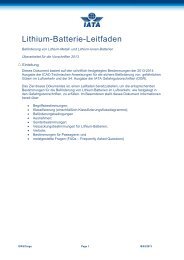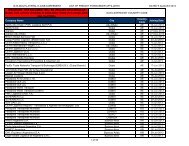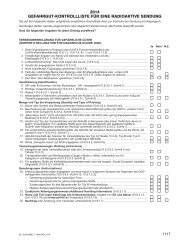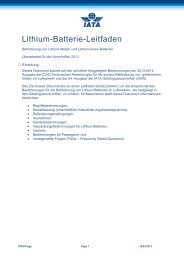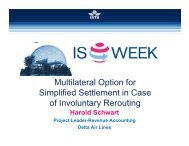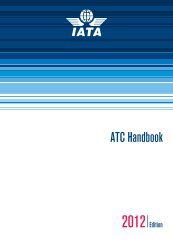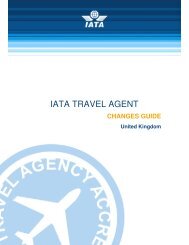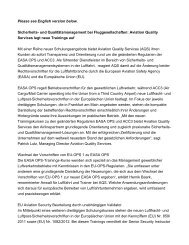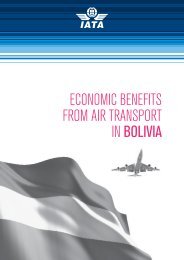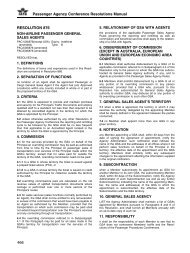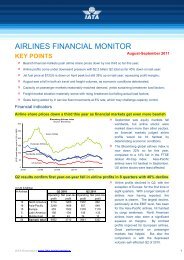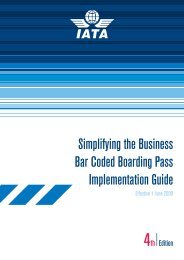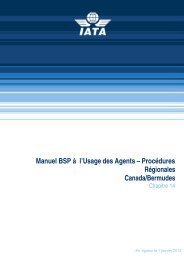Create successful ePaper yourself
Turn your PDF publications into a flip-book with our unique Google optimized e-Paper software.
On 23 August 2011, new rules<br />
on passenger rights came into<br />
effect in the United States.<br />
They impose a substantial fine<br />
on international airlines for<br />
tarmac delays of four hours or<br />
more and raise passenger compensation.<br />
Further regulations<br />
came into effect in the United<br />
States in January <strong>2012</strong> that<br />
refine how airlines interact with<br />
their customers. These regulations<br />
will not fix the root causes<br />
of the problems and could have<br />
unintended consequences.<br />
FEATURE<br />
What is right for the passenger?<br />
No airline wants to disappoint<br />
passengers. Market forces and<br />
not regulations are the best<br />
guarantee of strong customer<br />
service. Passengers only have<br />
to walk a few steps at a typical<br />
airport if they want to change<br />
carriers. A competitive market<br />
soon weeds out poor service.<br />
Delays or canceled flights<br />
adversely affect airlines. They<br />
put crews and aircraft out of<br />
position and damage airlines’<br />
reputations. Airlines have to<br />
either increase passenger fares<br />
to cover the cost of delays or<br />
accept the cost as a part of<br />
doing business. Both options<br />
are unwelcome in a competitive<br />
market, so it is in airlines’ interests<br />
to avoid delays whenever<br />
possible.<br />
Moreover, the new US rules on<br />
passenger rights provide incentive<br />
for carriers to cancel should<br />
a delay be expected. The US<br />
Government Accountability<br />
Office estimates that the number<br />
of flight cancellations has<br />
increased by more than 5,000<br />
since the first set of tarmac<br />
# 29<br />
delay rules, applicable to<br />
domestic flights, took effect in<br />
April 2010. That is of no benefit<br />
to consumers.<br />
The tarmac delay rules share<br />
something in common with<br />
its European counterpart,<br />
Regulation 261. Delays and<br />
cancellations are seen purely as<br />
an airline problem. So airlines<br />
are penalized for bad weather<br />
and volcanic eruptions even<br />
though no amount of fine can<br />
rectify the vagaries of Mother<br />
Nature. Similarly, air traffic management<br />
inefficiency and a lack<br />
of infrastructure capacity are<br />
out of airline control, and yet<br />
carriers are held accountable.<br />
The European Commission<br />
is reviewing Regulation 261.<br />
Its lopsided framework was<br />
exposed by the Icelandic<br />
volcano eruption in 2010 when<br />
the draconian compensation<br />
measures imposed were clearly<br />
an unintended consequence of<br />
poor regulation. <strong>IATA</strong> has made<br />
its views known to the review<br />
body, and a report from that<br />
body is imminent.<br />
Unfortunately, in the United<br />
States regulators are retreating<br />
further from the free market<br />
principles by which they were<br />
guided during the first three decades<br />
of airline deregulation. In<br />
their place is micromanagement<br />
regulating how airlines may<br />
compete in response to the<br />
demands of the marketplace.<br />
This discourages creativity<br />
and adds costs. Of particular<br />
concern is that the Department<br />
of Transportation is considering<br />
issuing a third passenger rights<br />
rule that could mandate that<br />
airlines distribute their products<br />
through specific channels<br />
such as the global distribution<br />
systems.



